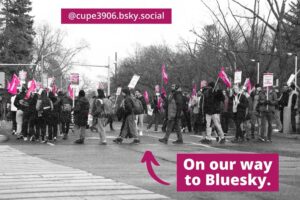TA Training payments – up to 5 hours of pay at your regular rate – will be made to those who have completed the training on the February 7th pay date. If you are a new TA (or a returning TA who has yet to complete the TA training), please do so as soon as possible to receive your pay on a future pay cheque. TA training was a major victory by our bargaining team in 2019. You can find more information on how to register here: https://hr.mcmaster.ca/app/uploads/2021/08/TA-Training-Communication_How-to-Register.pdf
McMaster Employment Equity Census
Employment equity is important to ensure the presence of a diverse and inclusive workforce, as well as to ensure that the needs of a diverse workforce are being heard. McMaster’s 2025 employment equity census is available, anonymous, optional, and quick. You can find information about how to fill it out here: https://hr.mcmaster.ca/app/uploads/2023/08/How-to-Complete-The-Employment-Equity-Census-Mosaic-ESS-Job-Aid.pdf
Winter 2025 GMM Schedule
Winter GMMs have been announced for the following days and times. All meetings will be held remotely via Zoom.
- Monday January 20, 2pm
- Monday February 10, 2 pm
- Monday March 17, 2pm
- Monday April 14, 2pm
An email link for registration will be sent to your McMaster email address each month in advance of the meeting.
Important Dental Coverage Information for Units 1 and 2 Members Working in the Winter 2025 Term
If you are a “Classification ‘A'” Teaching Assistant or Research Assistant (in Lieu) and/or a Sessional Faculty and/or Hourly Rated Sessional Music Faculty who is working in the Winter 2025 term (but did not work in the Fall 2024 Term), this message is for you!
(“Classification ‘A’ refers to TAs who already hold an undergraduate degree.)
The Dental Change of Coverage Period is now in effect for Units 1 and 2 members (who meet the description above).
Eligible Units 1 and 2 Members who are working in the Winter 2025 term (and did not work in the Fall 2024 term) may opt-out of dental coverage or enroll in family dental coverage until January 31, 2025, by following the instructions on our website (links below).
CLICK HERE for a link for more information, instructions, and forms for these processes for Teaching Assistants and Research Assistants.
CLICK HERE for a link for more information, instructions, and forms for these processes for Sessional Faculty and Hourly Rated Sessional Music Faculty.
Please note that you must complete this process every academic year if you wish to keep your dental opt-out or family dental coverage status in effect.
Please note that we can no longer accept dental opt-outs or family enrollments for members who worked as Unit 1 (“Classification ‘A’) or Unit 2 members in the Fall 2024 term.
Background: CUPE 3906 Unit 1 (“Classification ‘A'”) and Unit 2 members are automatically enrolled in single dental coverage every academic year according to our Collective Agreements. For more information, please visit https://cupe3906.org/tas-unit-1/dental-plan/ (for TAs and RAs in lieu of TAs) and/or https://cupe3906.org/sessionals-unit-2/unit-2-dental-coverage/ for Sessional Faculty and Hourly Rated Sessional Music Faculty.
In Memoriam: Walter Cristofoli, Member Mobilizer
It is with a heavy heart that we announce the passing of our beloved staff member Walter Cristofoli, with whom the membership and staff of the union shared countless memories throughout the years he has been involved.
Walter passed away suddenly on Thursday, December 5th of natural causes while working to mobilize his fellow Sessional Faculty members for their strike vote. Members of the executive were with Walter in his final moments and were reassured by doctors that he did not suffer.
Walter is survived by his brother Elliott and his two dogs: Miru and Frank.
Walter dedicated countless hours to building our union’s strength and engaging with members in one-on-one conversations as part of his work. If you have worked as a Sessional, there is a good chance that you have had a conversation or two with Walter over the phone and that his characteristic humour and warming presence brightened your day a little bit. We will certainly miss the way his calm demeanor and quick wit got us through countless days in the office.
If you have any memories with Walter, we encourage you to reflect on them fondly and take some time to appreciate how he affected you personally.
Plans are underway for a small celebration of life dedicated to Walter’s memory on campus, more details will follow as things are flushed out. In the meantime, memorial visitation will be held on Friday December 20, 2024 at Kopriva Taylor Community Funeral Home, 64 Lakeshore Road West Oakville, (one block East of Kerr Street) from 1pm – 4 pm.
https://www.koprivataylorcommunityfuneralhome.com/obituary/walter-cristofoli
Please take care of yourselves,
CUPE 3906 Staff and Executive
December 2024 General Membership Meeting Cancelled
The General Membership Meeting (GMM) that was initially scheduled for December 11, 2024, is cancelled. All regularly scheduled business for the December GMM (including the proposed bylaws amendments) will occur at the January General Membership Meeting.
We apologize for any inconvenience, and look forward to seeing members at our January GMM!
Notice of forthcoming Bylaws Changes to Articles 1, 4, and 9.
This proposed language is presented at the November 2024 GMM. Voting on this proposed language to occur at next GMM (December 2024): CUPE Local 3906 Proposed Bylaw Changes – article 1 and 4 presented Nov 2024 and CUPE Local 3906 Proposed Bylaw Changes – article 9 presented Nov 2024 (yellow highlight = proposed new language, strikethrough = proposed deletions)
UPDATE! DECEMBER 5, 2024: Because our December 2024 GMM has been cancelled, voting on the proposed bylaws changes will occur at our January 2025 GMM.
McMaster Employment Equity Census
Participation is completely optional and anonymous, but if you’re interested in filling in McMaster’s Employment Equity Census, you can find it here: https://hr.mcmaster.ca/employees/employment-equity/employment-equity-census/
We Support Postal Workers – outgoing mail delayed
We support striking postal workers!! Please be patient during the strike – our outgoing mail, some steward honorarium cheques and professional development cheques, will be on hold until the strike has been resolved. Solidarity with all those who are fighting for good jobs.




